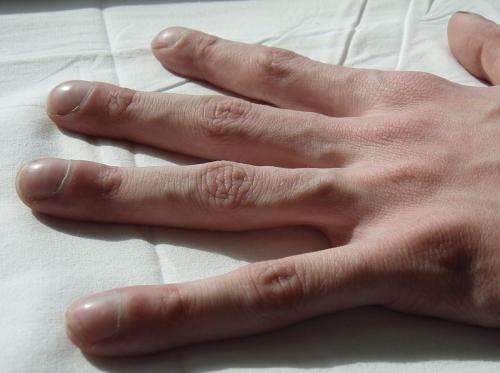
A major national study led by experts from Bristol and Nottingham has found that oral antibiotics are just as effective as intravenous antibiotics in killing a common germ that causes dangerous complications in cystic fibrosis (CF) patients.
The study looked at the effectiveness of the two types of treatment in tackling Pseudomonas aeruginosa, which causes a chronic destructive lung infection in CF patients and which cannot be eradicated unless it is caught in the early stages.
Dr. Simon Langton Hewer, a consultant respiratory paediatrician at University Hospitals Bristol and Weston NHS Foundation Trust (UHBW) and chief investigator of the study with colleagues at the University of Nottingham, said: “I’m very excited to be able to share the results of this very important study which has implications for adults and children with CF who have a new infection of Pseudomonas aeruginosa.
“Our study found that traditional oral antibiotics are just as effective as intravenous antibiotics, which means that CF patients who have a new Pseudomonas aeruginosa can be treated at home and saved the inconvenience of having to be admitted to hospital for treatment.
“The results of the study provide evidence to guide practice in CF centres and will help to reduce unnecessary hospital admissions.”
Pseudomonas aeruginosa is a bacterium that lives in the environment, lurking in places such as sink drains. Most CF patients have chronic lung infection with the germ by their late teens. Oral and nebulised (inhaled) antibiotics have mainly been used to eradicate Pseudomonas, but are only effective if the infection is caught in time.
Intravenous antibiotics are used commonly to eradicate the infection, however until now there was no clear scientific evidence that intravenous treatment is any better than oral. The TORPEDO trial has shown that routine use of intravenous antibiotics, to eradicate Pseudomonas, is not justified. However, there will still be circumstances (such as a worsening cough or drop in lung function) where intravenous treatment will be needed. Intravenous treatment means that patients with CF need to spend up to two weeks in hospital.
The 10 year trial was sponsored by UHBW and funded with £1.5 million from the National Institute for Health Research (NIHR) Health Technology Assessment (HTA) programme. In total 286 patients took part in the study at 70 CF centres and clinics around the UK and two in Italy. The findings of the study will be published in The Lancet Respiratory Medicine.
Professor Alan Smyth, from the University of Nottingham’s School of Medicine and a co-chief investigator in the TORPEDO clinical trial, said: “For many years we felt we should admit children with cystic fibrosis for intravenous antibiotics when they first had a Pseudomonas infection.
“This can be upsetting for the child and their family and can disrupt school and family life. Thanks to the TORPEDO trial, we now know that oral and inhaled treatment is at least as effective as intravenous, in most cases. In future, we can give this treatment at home and avoid the inconvenience and expense of a hospital admission.”
The results of the study have been welcomed by the families of patients and the Cystic Fibrosis Trust.
Adele Farrow’s daughter Niamh, who is aged 13 and who has Cystic Fibrosis, took part in the trial.
Adele, from Pilning, South Gloucestershire, said: “This is an amazing result that would really change life for Niamh and us as a family if Niamh developed Pseudomonas.
“Not having to go into hospital and have intravenous medication is a big thing and it’s really positive that the results would mean she could stay at home for antibiotics if she developed this infection.”
Source: Read Full Article
